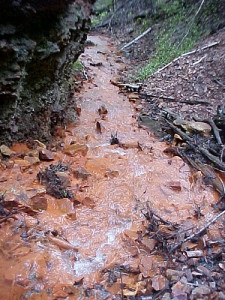We have much more to do and your continued support is needed now more than ever.
New Report: Mine Waste is Poisoning Our Waters
An eye-opening new report from our friends at Earthworks and MiningWatch Canada catalogues the wide range of damage to ecosystems, wildlife and human health caused by hardrock mining and identifies the world’s bodies of water in greatest jeopardy from toxic mine waste.
Download the report: Troubled Waters: How Mine Waste Dumping is Poisoning Our Oceans, Rivers and Lakes

Mining companies are dumping more than 180 million tonnes of hazardous mine waste each year into rivers, lakes, and oceans worldwide, threatening vital bodies of water with toxic heavy metals and other chemicals poisonous to humans and wildlife.
For too long, the mines that produce our gold, silver, copper, and uranium have been using our nation’s most pristine streams, lakes, and groundwater as dumping grounds for their toxic wastes. These are the waters from which we drink, in which our children swim, and which support our fish and wildlife.
In theory, the Clean Water Act should halt this destructive practice. Unfortunately, there are two “loopholes” in the regulations implementing the Clean Water Act that have allowed mine developers to circumvent the purpose of this critical law. A key recommendation from the “Troubled Waters” report states:
Two loopholes in the U.S. Clean Water Act, a law that was passed to protect water from industrial pollutants, allow mining companies to dump toxic mine waste untreated into rivers, lakes, streams and wetlands. Governments should close loopholes and create a regulatory environment that puts the health of our water and ecosystems over corporate profits by prohibiting this unnecessary practice.

The good news is, with a simple rule change, the Environmental Protection Agency (EPA) and Army Corps of Engineers can close these loopholes and stop Big Mining from using our waters as industrial waste dumps. Closing the loopholes would not prohibit hard rock mining but it would greatly reduce the negative environmental impacts from large mines.
National Wildlife Federation, along with Earthworks and other partners, is working to stop irresponsible mining practices which pollute the waters that sustain our communities, fish, and wildlife.
![]() Urge the EPA and Army Corps to stop Big Mining from using our waters as industrial waste dumps.
Urge the EPA and Army Corps to stop Big Mining from using our waters as industrial waste dumps.




















